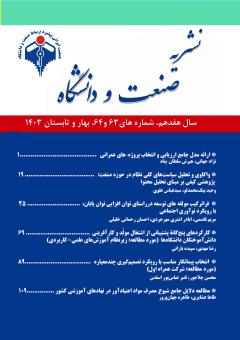ارائه مدل جامع ارزیابی و انتخاب پروژه های عمرانی
محورهای موضوعی : تخصصی
نژاد جهانی
1
![]() ,
هیرش سلطان پناه
2
,
هیرش سلطان پناه
2
![]()
1 - دانشجوی دکتری عمران، واحد سنندج، دانشگاه آزاد اسلامی، سنندج، ایران
2 - دانشیار گروه صنایع، واحد سنندج، دانشگاه آزاد اسلامی، سنندج، ایران
کلید واژه: مدیریت, مدیریت بهینه, مدیریت پورتفولیوی, پروژه¬های شهری, پروژه¬های عمرانی,
چکیده مقاله :
در عصر حاضر بسیاری از سازمانهای پروژه محور، در راستای ضرورت برقراری ارتباط معنادار راهبردها و طرحها و پروژه ها و نیل به بهره وری هرچه بیشتر طرح ها و پروژه های خود، رویکردشان را از
پروژه محوری به مدیریت سبد پروژه سوق داده اند. در تحقیق حاضر معیارهای مؤثر بر انتخاب سبد بهینه پروژه های عمرانی با روش کیفی مورد بررسی قرار گرفت. بر اساس مطالعات کتابخانه ای و اسنادی و استانداردهای مرتبط، تعدادی از شاخصها شناسایی شده و میزان تأثیر آنها با روش گراندد تئوری با استفاده و بکارگیری کدگذاری سه مرحلهای، دادهها و از طریق پرسشنامه و مصاحبه با جامعه آماری منتخب از بین کارشناسان و مدیران حوزه های فنی، عمرانی دستگاه ها و مجریان و پیمانکاران، اولویت و میزان تأثیر عناصر مختلف مورد بررسی قرار گرفتند. در نهایت شاخص های متعددی استخراج شد. نتایج نشان داد که دوازده شاخص اصلی مؤثر بر انتخاب بهینه پروژه های عمرانی عبارتند از: 1- کیفیت 2- زمان مناسب 3- تاب آوری 4- کارائی و اثربخشی 5- پاسخگویی 6- هدفمندی 7- قابلیت دستیابی به هدف 8- بودجه 9- زمان بندی 10- دسترسی به تأمین مصالح 11- مستندسازی تفصیلی 12- عملکرد موازی که در گام نهایی از طریق شاخص کاپا میزان توافق بین کدگذاری انجام شده توسط پژوهشگر با نخبگان بررسی شد. در این پژوهش کدهای استخراج شده نهایتاً با چهارده مصاحبه به اشباع تئوریک رسید. در نهایت با توجه به ماهیت کیفی و کاربردی بودن پژوهش و با استفاده از درک علمی و اتکاء به سوابق متعدد اجرایی پژوهشگر در هر دو بعد فنی و مدیریتی سازمانهای پروژهمحور و استفاده ازشاخص های استخراج ش ده، نهایتاً مدل مفهومی برای طراحی و مدیریت بهینه سبد پروژههای عمرانی در سازمانهای پروژهمحور کشور ارائه گردید
In today's era, many project-oriented organizations, driven by the necessity of establishing meaningful connections between strategies, plans, and projects, and aiming to maximize the productivity of their plans and projects, have shifted their approach from project-centric to portfolio management. In this study, the criteria influencing the selection of an optimal portfolio of construction projects were examined using a qualitative method. Based on library and documentary studies and related standards, several indicators were identified, and their impact was assessed through grounded theory methodology using three-stage coding. Data were collected through questionnaires and interviews with a selected statistical population of experts and managers in technical and construction fields, as well as contractors and project implementers. The priority and impact of various elements were analyzed. Ultimately, multiple indicators were extracted. The results revealed that the twelve main criteria influencing the optimal selection of construction projects are: 1) Quality, 2) Timeliness, 3) Resilience, 4) Efficiency and Effectiveness, 5) Accountability, 6) Purposefulness, 7) Achievability of Goals, 8) Budget, 9) Scheduling, 10) Access to Material Supply, 11) Detailed Documentation, and 12) Parallel Performance. In the final step, the Kappa index was used to evaluate the agreement between the coding performed by the researcher and the experts. In this study, the extracted codes reached theoretical saturation after fourteen interviews. Finally, considering the qualitative and practical nature of the research, and leveraging the researcher’s scientific understanding and extensive practical experience in both technical and managerial aspects of project-oriented organizations, as well as the extracted indicators, a conceptual model was proposed for the optimal design and management of construction project portfolios in project-oriented organizations in the country.
